By Lucy Komisar
This play may be about the 16th century, but the dialogue, the politics, the economics, the power struggles give you a sense of watching the mafia.
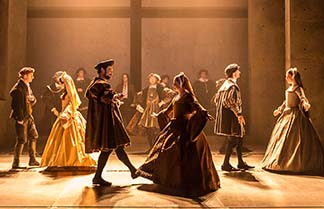
Except that rather than focus on money, we are watching the dramatic repercussions of King Henry VIII‘s desire to get a wife who will give him a male heir.
We see the elegance of class with its formal dancing. And hear contemporary quips. “What do you eat there?” “Londoners.” When the King wants to divorce, the riposte is, “He‘ll have half the world against him. The women.”
Mike Poulton‘s adaptation of Hilary Mantel‘s drama of Henry VIII seems like it could be on Masterpiece Theater. And actually, a TV version ran the same time as the play. Didn‘t see it. But TV versions are often unsubtle, even crass. This play is brilliant.
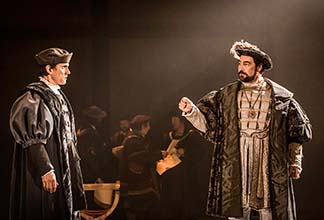
Thomas Cromwell (the fine Ben Miles) is a lawyer. And very smart. He has hidden banned books by Luther. That‘s curious. He doesn‘t seem like a guy promoting free thought. Note that this isn‘t the famous Oliver Cromwell who would run England, it‘s his ancestor.
The plot turns on women, whose only power is manipulation, as Henry (a very good Nathaniel Parker) sheds one wife for another. He wants a male heir, because that person will be king. He predicts that if he dies without a son, there will be civil war.
Sisterhood is not always powerful. Mary Boleyn (Olivia Darnley) knows her sister Anne‘s secrets: she listens at the door. Her brother George (Edward Harrison) is hardly more of a loyal sibling. He tells the Cardinal Thomas Wolsey (the excellent Paul Jesson),” You don‘t know my sister Anne,” and Wolsey replies, “No, but I‘m sure I could if I paid cash down.” Considering this is feudalism, sexism comes with the territory.
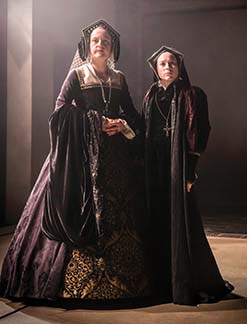
Henry needs to divorce Katherine of Aragon (Lucy Briers), his late brother‘s wife, who he had married. This requires action by the Pope. It‘s the story we know from “A Man for All Seasons,” about the hero cleric, Thomas Moore (John Ramm), who would not support Henry against the church, refused to accept Henry as head of church in England with his children as heirs.
But here Moore is the bad guy. Woolsey says Moore would burn all the Bible scholars – and Cromwell declares, “He would burn Christ himself if He came walking up the Thames.”
You get pulled into the story by the contemporary dialogue. Cromwell says, “The King has Katherine in one household and Anne Boleyn in another. He runs back and forth between them and they both shout at him. They‘re leading him a dog‘s life. Last time I saw Katherine she wasn‘t crying. She was briefing her lawyers.”
Sometimes Henry seems like a lovesick puppy. He complains that Anne Boleyn (a terrific Lydia Leonard), is threatening to leave him. “She‘s wasting her youth, she says ” there are other men want to marry her. Other men! What am I to do?”
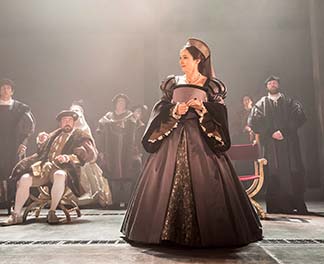
We hear about the horror and glory (another horror) of leaders who make war. Emperor Charles V’s soldiers sack the city. The thuggish Duke of Norfolk (Nicholas Day), who is Anne‘s uncle, declares to Cromwell, “We own France. We have to go and get it back! What‘s wrong with you people?”
When Henry asks Cromwell if he hunts, he says, “I favor any sport that keeps young men off the battlefield.”
Henry says, “The chase prepares us for war… Which brings us to a sticky point, Cromwell….Six years ago you said in the Parliament I could not afford a war.”
Cromwell tells him, “No ruler in the history of the world has ever been able to afford a war. Wars are not affordable things. No prince ever says ˜This is my budget, so this is the kind of war I can have.‘ No. War uses up all the money you‘ve got – then it breaks you and bankrupts you.”
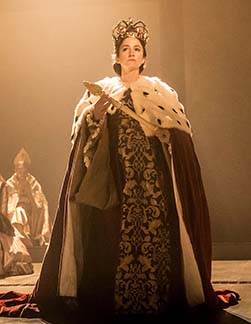
The King: “What use is a king that can‘t fight? Should I stay indoors and ply my needle like a girl?”
Interesting stuff, even if there‘s no proof the dialogue ever occurred.
Cromwell knows about money; he trained in a Florentine bank. Henry makes him chancellor.
The war is with Anne Boleyn, who is first seductive, then tough, aggressive, manipulative. On the matter of the Pope authorizing Henry‘s divorce, she says, “The Pope should learn his place and I am the woman to show him what his place is.”
But she doesn‘t understand the power relations of male v female.
Henry‘s motivation for marrying Anne: he has had only daughter, Mary. Six sons died. The irony is that when Anne has a child it is a girl – and what a girl, Elizabeth I!
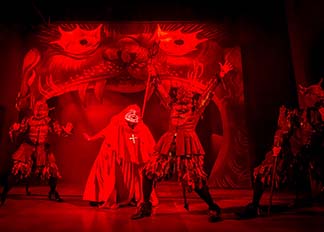
Religion and the afterlife was real, which leads to a dramatization of Hell. And to Cromwell’s conversation with Wolsey‘s ghost.
Wolsey: I‘m pleased to see you keeping up the tradition of the eighteen hour day.
Cromwell: Eighteen hours, that‘s all? Those were the golden years, Wolsey. (He writes.) Henry misses you, you know. He was talking about you today.
Wolsey: I don‘t miss him. Who‘s that you‘re writing to?
Cromwell: Martin Luther.
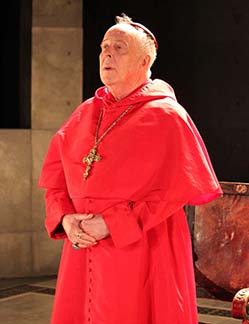
Wolsey: That heretic? Ah well. Times change. … Now, have you got a question for me?
Cromwell: Yes. Where do I find the King an heir?
Wolsey: I used to ask you that. You had no answer, did you? It brought me down. Be careful, or it will finish you too.
The innocent, shy Lady Jane Seymour (Leah Brotherhead), lady-in-waiting to Katherine and then Anne, is waiting in the wings.
Cromwell, a lawyer, argues like one. He is smarter than Henry. He tells him, “England needs better roads, Majesty. And harbors. And bridges that don‘t collapse. Suppose we gave employment to men with no work – it would solve two problems.”
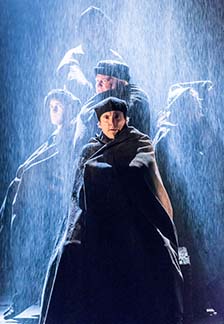
Is he a closet liberal? Maybe not. At any rate, he discovers that‘s not what counts. Ambition takes over. Sometimes those we thought were the best of men for political advantage become killers. The good guys torture. The power of Mantel‘s story is that it‘s a political commentary for our times.
The direction by Jeremy Herrin, with help from set and costume designer Christopher Oram, is spell-binding. When Cromwell is in a boat on the Thames, you can feel it, sense the damp. Most of the colors are shades of black and gray, stone and marble. The background music by Stephen Warbeck has the drama of classic opera. The production is a memorable event.
“Wolf Hall.” From the novels by Hilary Mantel; adapted by Mike Poulton; directed by Jeremy Herrin. Winter Garden Theatre, 1634 Broadway, New York City (50-51 Streets). Parts I and II, each 2 1/2 hours. Best seen in succession with 2 1/2 hour dinner break. Opened April 9, 2015, closes July 5, 2015. 6/10/15.


Actually, Wolf Hall has just been on Foxtel here in Australia, several episodes of brilliant casting, can’t wait for the sequel, if there is one, but of course there is nothing like the stage… Lucky Lucy, the World’s stage is coming to Broadway.
That said, there is probably more depth in the series, due to time factor no doubt, where we see Thomas Cromwell wriggling his way through the dangerous maze of the English Court of that time. If there was a tittle suited to Thomas Cromwell it would have to be ‘A man for all seasons’ (rather than Thomas More), the son of a blacksmith, great traveler, soldier of fortune, spoke many languages, highly cunning and certainly very intelligent, head strong but, in the end, not to the point of surviving his decapitation in July 1540…
In fact, if there was a candidate to the Shakespearian authorship controversy, which is better served as seeing William Shakespeare as ‘a profession’ rather than the works of an individual, Thomas Cromwell would’ve been the perfect man to start putting together some of the plays (which we know to be chronologically much older than late 16th or early 17th centuries) as a precursor for mind-control and repetitive truth bashing use of prophetic & beautiful verses in the context of an awareness to quantify the logic of self-destructive outcome within any ‘Power to be’, now haven’t we seen this happening quite a bit lately,..
In any case, Oliver Cromwell, his distant relative, will be the one to ‘balance the mark of History’, as the key figure in the execution of Charles I, and perhaps the only man to have truly deserved the crown of England on his head, but declined it, later to be exhumed from his grave in Westminster Abbey, and to be subjected to the ritual of a posthumous execution, 880 days after his death, as if we were in need to be reminded of the follies of certain human behavior, but I’m digressing a little here…
Thank you Lucy for this wonderful review, please keep up the good work, we are grateful to have you there in our behalf to convey the magic of a play.
Yours faithfully